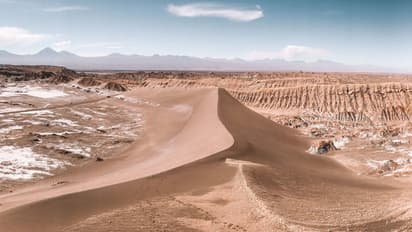THIS is the driest place on Earth with no rainfall; Check out
Published : Nov 14, 2024, 05:23 PM IST
The Atacama Desert, with no rainfall for 400 years, boasts a unique landscape. Its scenery evokes science fiction, with some areas resembling Mars
Explore the latest Lifestyle News covering fashion, wellness, travel, Food and Recipes, and more. Stay updated with trending Health News, fitness tips, and expert insights to inspire your daily living. Discover personalized lifestyle trends that keep you stylish and informed. Download the Asianet News Official App from the Android Play Store and iPhone App Store for everything that adds value to your everyday life.
